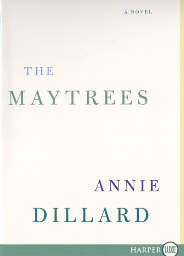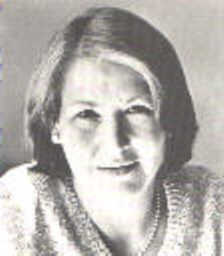The previous novel of Annie Dillard's that I read was about a family who lived
on the opposite end of the continent from the Maytrees, in a place where fir trees
grew down to the edge of the Pacific Ocean, near what is now Bellingham,
Washington. From ubiquitous fir trees to ubiquitous sand, we move in this novel to
the tip of Provincetown whose original name was simply Cape Cod until the cape
area developed so much the tiny town needed its own name. Long before there
were any colonies British fisherman loaded up with cod off the side of the long
string of sand dunes we call Cape Cod today. There, sitting on the end of the
muscleman arm-like Cape, where a clenched fist would be, is the town of
Provincetown, and there is where our story unfolds for Toby and Lou Maytrees.
They were married, which Robert Louis Stevenson called "a sort of friendship
recognized by the police." (Page 10) Her friend Reevadare told Lou that her
favorite part of marriage was this — "It's a marvelous way to get to know
someone." She had a string of marriages and seemed to have enjoyed them all. She
advised Lou, "Keep your women friends, darling. Men come and go." (Page 30)
Toby and Lou lived for a long time without a car, often walking without shoes
while going down to Toby's shack on the beach. One night late in the book, Toby
comes back after many years and as he walks to his shack, he gives new meaning
to going by foot, he takes off his shoes so that he could navigate along the shore by
feeling his way with his bare feet on a moonless night with no flashlight, because
his arms were in casts.
Toby's work was light construction, but he specialized in moving houses. One
time they were moving a house for the Protos while the wife remained inside the
slowly moving house, cooking.
[page 45, 46] Old Flo Proto, inside, chopped onions and carrots.
People could hear her knife hit, or was it a hatchet. Maytree
guarded the mules while Sooner rounded up two tractors and
Flo Proto cranked up her woodstove. The tractors, themselves
whacked, worked. Splay-legged in her wobbling kitchen, Flo
Proto cooked on the woodstove a slumgullion to feed the crew.
The chimney smoked, and its smoke marked their route.
Schoolchildren broke out to trail the house.
Lou loved Toby, her first love, and they seemed well-suited to each other,
getting married because they got along so well. Even after two years married, they
still danced together to the radio in the kitchen.
[page 48, 49] After their first year or so, Lou's beauty no longer
surprised him. He never stopped looking, because her face was
his eyes' home. No, what so endeared her now and forever was
her easy and helpless laughter. He like the world's greatest wit.
She worked, walked, stood, or sat like a mannequin, shoulder
down and neck erect, and his least mot slayed her. Her body
pleated. Her rusty-axle laugh sustained itself voicelessly and
without air. At table, if she was still chewing when the laugh
came rolling on her backward like a loose cart, she put a napkin
on her head. Otherwise she dropped it on the table. If it slayed
her yet more, she knocked the table with her head in even beats.
Or her long torso folded and her orbits fell on vertical fists on
her knees. Unstrung with hilarity, she lost her footing and
rolled down a dune. More than once — anywhere — she
dropped backward and straight-legged like a kid in diapers.
Their son Petie was born and grew up. On the day when a car hits him while
riding his bike, Petie fractures his leg, and his father Toby announces to Lou that
he's leaving, moving to Maine with Deary, one of their Provincetown friends. Lou
thought, "An island in Maine was just the place for a carpenter poet." (Page 75)
She had lived alone before she met and married Toby and would continue to live
alone again, but this time she would have Petie with her.
In The Living a man killed someone by tying him to a pier at low tide and
leaving him to drown when the tide came in. In this novel, two men are similarly
drowned by the tide, but under a different set of circumstances.
[page 80, 81] Even the mud flat was matte. Last spring in the
mud at Drummer Cove, two men oystering the bay at low tide
got stuck. Their struggles drove their boots and legs deeper. It
was April in the area of summer cottages; no one heard their
shouts. Drummer Cove off Blackfish Creek had a ten-foot tidal
range. When the tide came in, it drowned them. Later at a
sunny half tide their torsos stuck out again, bent. The
harbormaster in his boat dragged their bodies out chained
under the armpits.
When I was about 18 I saw a wrecker pulling a dead body from the black
muck of a ditch next to where a car had sunken into the shallow water but deeper
mud. It was a sight that I wished I hadn't seen and never wanted to see again.
When we moved into a larger home a few years ago, one reason was it had
three guest bedrooms, something useful with grandchildren of both sexes staying
with us with their parents from time to time. This has not happened often enough
to justify three extra bedrooms (which were not our only reason for getting this
new home), so I had to chuckle when I read Dillard's comment about a cargo cult.
Maytree was constantly being asked build to extra bedrooms on the Cape,
especially for newcomers.
[page 122] New people asked for many bedrooms because they
truly believed their children and spouses and grandchildren
would pass all their summers, if not all their free time, there
with them, simultaneously. The empty bedrooms amounted to a
cargo cult, clearing airstrips to attract planes that never came.
Petie was growing up. Carrying him, he patted her shoulder for each step Lou
took. If he stopped patting, she stopped walking. Petie was controlling her walking
and they both laughed out loud about that. Soon baby Petie, toddler Petie, and all
the little Peties were gone, and one day the friends came by to drag grown-up Pete
a party which would be dull without him. After he left, Lou had a marvelous
imagination, one that any parent could try if ever they felt lonely for their children.
[page 125] His friends hauled Pete away. She confronted the
sink. How she wished she could see all those displaced Petes and
Peties once more! She imagine joining picnic tables outside by
the beach and setting them for 22 Peties and Petes, or 122, or
however greedy she was that day and however divisible Pete.
Together the sons at every age and size — scented with diaper,
formula on rubber nipples, salt-soaked sand, bike grease, wax
crayon, beer, manila, engine oil, fish — waited for dinner. Who
else knew what each liked? It was a hell of a long table. She
gave herself a minute to watch them — Petie after Peties
barefoot near his future self and past. They pinched or teased
or shoved one another. All but the babies ignored the babies.
What mother would not want to see her kids again?
We were at Orange Beach, enjoying its pristine white sand and emerald green
Gulf waters while I was reading this book. About the time I was reading the next
passage my daughter was taking her teens to go parasailing over the Gulf and zip-lining through a State Park, and paddling a surfboard over an alligator filled pond. I
chuckled.
[page 150, 151] An Athens marketplace amazed Diogenes with
"How many things there are in the world of which Diogenes
hath no need!"
They get older. Deary becomes frail and while carrying her from the doctor's
office in Maine one frigid day, Toby's feet slip out from him, and he quickly tosses
Dreary into a snow bank but is unable to prepare for his own fall and breaks both
his arms. Soon he has casts on both arms and decides he must move immediately
back to the Cape where Lou will take care of Dreary while his arms mend. It is on
this trip that he arrives late at night to find Lou is not at home, but at his shack,
closing it for the winter. The friend who drove them checks in a motel in town, and
Toby has her take off his shoes for him so that at night, he could find his way along
a path so familiar to his feet that he could do it blindfolded or in the deepest part of
the night.
[page 181] Maytree was — as their old friend Mary Heaton
Vorse said, — "night-footed." Up and down and veer up and
veer down and veer left and with luck find the swale's hard
sand. Farther along in the night's burrow, he must strike the
wavy jeep trail's ruts through each curve without bumping a
scrub tree or the old coast guard station's broken wall. . . . If he
walked into the sea, he had gone too far.
Toby and Dreary were Lou's old friends. She would learn how to ease
Dreary's pain, and say goodbye to all the things she had learned to cherish since
Toby had gone away: no schedule, only her own things about, no real meals, just
eating at her whim, and the delicious freedom on thinking whatever she wished.
My wife and I love it when we have company, but as soon as they are gone, we
realize how free and good it feels to be just the two of us again. No one who has
not experienced that kind of freedom, as we have, for 35 years, can imagine how
wonderful it is.
Dreary was now staying with the Whites indefinitely. It was a playful way she
had used during long partying days to leave a party while giving the impression she
might be going to another party that the people she was telling goodbye were not
invited to. What she actually did was go home and climb in bed between her white
sheets. They were the Whites she was heading towards. Now some of these friends
would come to visit her at the Whites party which took place on any day
downstairs in the room with windows which allowed her to look out at the seagulls
and boats on the bay.
Dreary was slowly dying and afterward, Toby and Lou looked at each other
like the lion and tiger raised together at the Bronx Zoo. They were milk brothers.
Lions and tigers hail from Africa and Asia respectively, and would fight if they
met. In the zoo these two were close. Neither had ever seen himself, only the other.
Each had looked at the other for as long as he could remember. So the lion thought
he was a tiger, as it were, and he feared adult lions. The tiger feared adult tigers.
Only in the face of the other did each find home.
The novel has a Dreary end, but not a dreary ending. The only question
remaining for Lou was Toby or not Toby.
~^~
Any questions about this review, Contact: Bobby Matherne
~~~~~~~~~~~~~~~~~~~~~~~~~~~~~~~~~~~~~~~~~~~~~~~~~~~~~~~~~~

 == == == == == == == == == == == == == == == ==
== == == == == == == == == == == == == == == ==
22+ Million Good Readers have Liked Us
22,454,155
as of November 7, 2019
Mo-to-Date Daily Ave 5,528
Readers
For Monthly DIGESTWORLD Email Reminder:
Subscribe! You'll Like Us, Too!
== == == == == == == == == == == == == == == ==
Click Left Photo for List of All ARJ2 Reviews Click Right Bookcover for Next Review in List
Did you Enjoy this Webpage?
Subscribe to the Good Mountain Press Digest: Click Here!


CLICK ON FLAGS TO OPEN OUR FIRST-AID KIT.
All the tools you need for a simple Speed Trace IN ONE PLACE. Do you feel like you're swimming against a strong current in your life? Are you fearful? Are you seeing red? Very angry? Anxious? Feel down or upset by everyday occurrences? Plagued by chronic discomforts like migraine headaches? Have seasickness on cruises? Have butterflies when you get up to speak? Learn to use this simple 21st Century memory technique. Remove these unwanted physical body states, and even more, without surgery, drugs, or psychotherapy, and best of all: without charge to you.
Simply CLICK AND OPEN the
FIRST-AID KIT.

Counselor? Visit the Counselor's Corner for Suggestions on Incorporating Doyletics in Your Work.

All material on this webpage Copyright 2019 by Bobby Matherne





